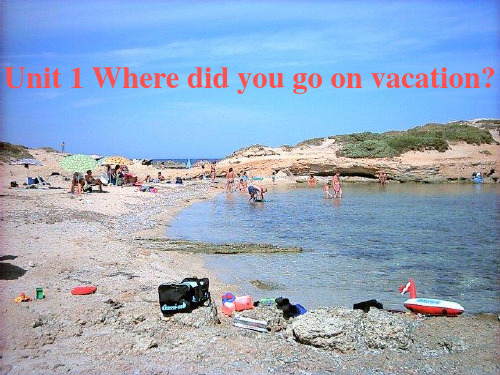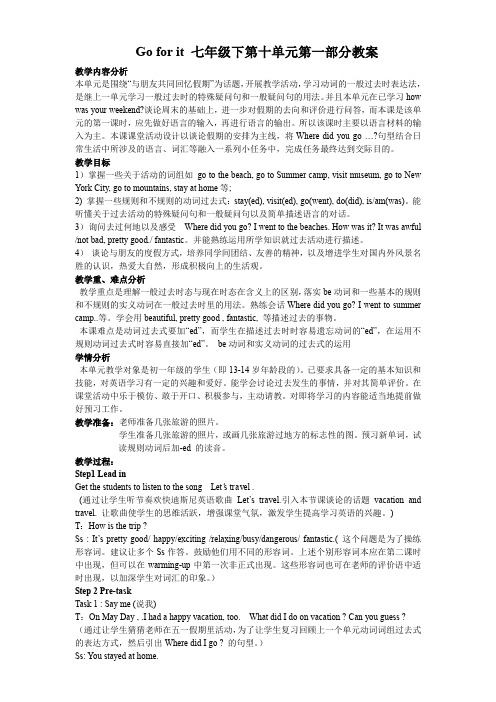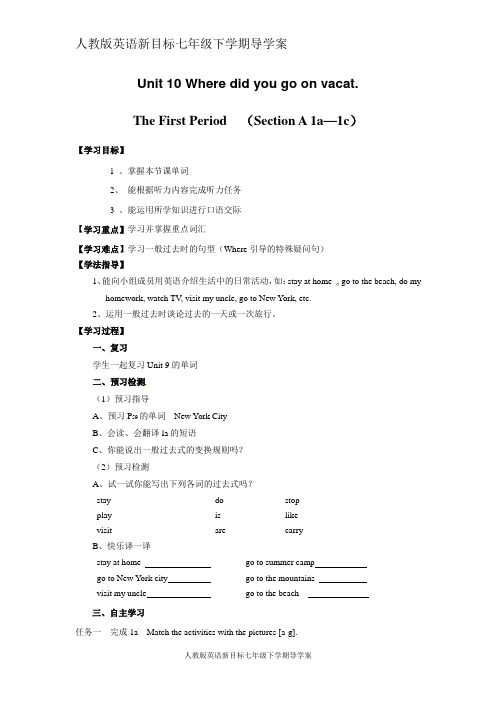人教版新目标七年级 Where did you go on vacation ( review)
七年级英语下册 Unit 10 Where did you go on vacation 教案新目标

Unit 10 Where did you go on vacation ?一、Analysis of the Teaching Material(教材分析):本单元是新目标英语《Go for it》七年级第二学期内容。
本单元讨论的话题是讨论人们过去所做的事情(Talk about past event),是非常具有实用性的内容。
学好本课,学生不但能够加深对一般过去时态的理解和运用,也可以用英语来和别人讨论假期人们是怎么度过的。
二、Analysis of the Students(学生情况分析):对于七年级第二学期的学生来说,他们在经过初一半年的英语学习后,已具有了一定的英语基础,同时也具备一些运用语言知识的能力。
在这样的基础上,学生对于讨论跟他们的假期生活密切相关的相关内容一定很容易产生兴趣,老师应在这一教学过程中培养学生的口语表达能力。
三、Design the principle(教学原理):新目标英语强调的是任务型的教学模式,强调学生要成为教学活动的主体,而老师只是从中起到协调引导作用,因此在我的教学设计里,比较重视学生活动。
充分调动学生的积极性,主动性,让他们成为学习的主动者。
本节课是第10单元的第一课时,主要让学生掌握基本句型“Where did you go on vacation?”四、Teaching Aims and Demands(教学目标和要求):1. Knowledge Objects(知识目标):Key vocabulary:New York,summer camp,museum,guide,exam,reallyKey sentence: Where did you go on vacation ?2.Ability Objects(能力目标):Write what you did last week.3.Moral Object(情感目标):A.在学习谈论节假日的活动时,学会与他人进行友好的交际。
新目标七年级英语下册Unit 10 Where did you go on vacation-教案

新目标七年级英语下册Unit 10 Where did you go onvacation?教案教案正随堂记录Unit 10 here did u g n vaatin?单元教材分析本单元是九年制义务程标准实验教科书《新目标英语》七年级下册第10单元本单元的核心话题是用一般过去时谈论度假等发生在过去的事情。
因此“here did u g n vaatin?” “ Did u g t the beah? es,I did.N,I didn’t.”等是教学的重点。
通过对本单元的学习,学生能掌握本单元出现的地点名词,用于询问和回答过去发生的事情的短语和句型。
单元知识结构1词汇:Ne r it; entral Par,exa,ere,rain,deliius,expensive,inexpensive.rded.fle,ite,later,felt,little, rner, disuss,et2句型: here did u g n vaatin? I ent t suer ap.Did she g t entral Par?es,she did.N, she didn’t3语法:一般过去时特殊疑问句、一般疑问句及肯、否定回答。
单元总体目标1.aster the vabular2.aster and use:here did u g n vaatin? I ent t suer ap·Did she g t entral Par?es,she did.N, she didn’t 单元教学重难点一览重点难点1.Vabular and Expressins2 Graar Fus:here did u g nvaatin?I ent t suer ap Did she g n entral Par?es, she did.N, she didn’tUse the past tense t tal abut ativities that happened in the past in English ith the flling sentenes:here did u g n vaatin?Did u g t…?es … /N,…单元学情分析学生在第五单元已接触过一般过去时,具有了学习本单元知识的认知前提,能自然地与本单元话题进行衔接。
英语:Unit_10_Where_did_you_go_on_vacation课件(人教新目标七年级下)

the people?
Lin: They
were ⑷
fantastic.
Lin: They
were ⑻
unfriendly.
PAIRWORK
How was the bus trip? It was relaxing.
PAIRWORK
How was the museum? It was boring.
Where did Tom go on vacation?
He went to summer camp.
Where did Sally go on vacation?
She stayed at home.
Where did Tina go on vacation?
She went to the mountains.
Amy: How was your vacation, Lin? Amy: How was the weather?
⑴
⑸
Lin: It
was ⑵
pretty good.
Lin: It was hot and humid. ⑹
Amy:
How
were ⑶
the beaches?
Amy: How
were ⑺
Oh, really? Did you go to Central Park? Yes, I did.
Fill in the blanks in the conversation. Use “was” or “were”. Example: It was rainy. The mountains were beautiful.
Where did you go on vacation?
人教版英语七年级下册Unit10_Where_did_you_go_on_vacation_教案

Go for it 七年级下第十单元第一部分教案教学内容分析本单元是围绕“与朋友共同回忆假期”为话题,开展教学活动,学习动词的一般过去时表达法,是继上一单元学习一般过去时的特殊疑问句和一般疑问句的用法。
并且本单元在已学习how was your weekend?谈论周末的基础上,进一步对假期的去向和评价进行问答,而本课是该单元的第一课时,应先做好语言的输入,再进行语言的输出。
所以该课时主要以语言材料的输入为主。
本课课堂活动设计以谈论假期的安排为主线,将Where did you go …?句型结合日常生活中所涉及的语言、词汇等融入一系列小任务中,完成任务最终达到交际目的。
教学目标1)掌握一些关于活动的词组如go to the beach, go to Summer camp, visit museum, go to New York City, go to mountains, stay at home等;2) 掌握一些规则和不规则的动词过去式:stay(ed), visit(ed), go(went), do(did), is/am(was)。
能听懂关于过去活动的特殊疑问句和一般疑问句以及简单描述语言的对话。
3)询问去过何地以及感受Where did you go? I went to the beaches. How was it? It was awful /not bad, pretty good./ fantastic。
并能熟练运用所学知识就过去活动进行描述。
4)谈论与朋友的度假方式,培养同学间团结、友善的精神,以及增进学生对国内外风景名胜的认识,热爱大自然,形成积极向上的生活观。
教学重、难点分析教学重点是理解一般过去时态与现在时态在含义上的区别,落实be动词和一些基本的规则和不规则的实义动词在一般过去时里的用法。
熟练会话Where did you go? I went to summer camp..等。
人教版七年级英语《Unit.10.Where.did.you.go.on.vacation》教案

Unit 10 Where did you go onvacation?Topic: Holidays and vacationsFunctions: Talk about past eventsStructures:Past tense of regular and irregular verbswas / wereHow questionsTarget language: Where did you go on vacation?We went to New York City.Did you go to Central Park?Yes, I did.How was the weather?It was humid.Teaching StepsPeriod 1Good morning everyone! We have finished Unit 9. Today we are going to learn a new unit—Unit 10.Step 1: Lead inAsk and answera. Can you tell me what the title of Unit 10 is? Yes, it’s Where did you go on vacation? What do you think the unit is about?b. Yes. In this unit we are going to talk about past events.Step 2: Section A 1aIn Unit 9, we talked about the recent past activities and in this unit, we are going to continue talking about the past events.First, please open your books at Page 59 and look at activity 1a.1. Look and findLet’s look at activity 1a and find what the phrases mean.2. MatchYou know what the phrases mean. Please match them with the pictures.3. Check the answersHave you finished? Let’s check the answers one by one.Answers: 1. e 2. b 3. d 4. c 5. a 6. f 7. g4. Reada. Please read the phr ases after me. Stayed at home …b. Let’s read them together.c. Would you please read them one by one?Step 3: Section A 1b1. Listen and numberListen to the tape. And number the people from 1 to 5 in the picture. 2. Check the answersLet’s check the answers.Answers: 1. went to the mountains2. visited my uncle3. stayed at home4. went to New York City5. went to summer camp3. Reada. I would like you to read the conversations together.b. Would you please read them by yourselves three times?c. This time I would like you to read them twice with your partner.d. Who would like to read in class?Step 4: Section A 1cPairwork1. ReadWould you please read the conversation in 1c with your partner?2. Practicea. Would you please make conversations with your partner to talk about where the people went on vacation in activity 1a?b. Who would like to have a try in class?Step 5: Section A 2a1. ListenNow class, let’s move to activity 2a now. Please listen to the tape for the first time.2. MatchWhere did Nancy, Kevin and Julie go on vacation? Please match the person with the place when you listen to it for the second time.3. Check the answersHave you finished? Please check your answer with your partner and see whether your answers are the same. Let’s check them together.Answers: 1. c 2. a 3. bStep 6: Section A 2b1. Listen and checka. Listen to the conversation for the first time.b. Please check (√) “Yes, I did.” or “No, I didn’t.” for each question as you hear them talk.2. Check the answersHave you finished? Let’s check them.Answers: go to Central Park? Yes, I did.play volleyball? No, I didn’t.swim? Yes, I did.go to the movies? No, I didn’t.study for exams? Yes, I did.3. Reada. Let’s read the conversations together.b. I would like you to read them by yourselves.c. Who would like to have a try to read them in class?Step 7: Section A 2cGroupworka. Now class, let’s move to activity 2c.It’s a groupwork. Would you please role play conversations between Nancy, Kevin, and Julie?b. Who would like to have a try in class?c. Well done. Please pay attention to the past forms of the verbs in the phrases.Step 8: Grammar Focus1. ReadRead the sentences in the grammar box.2. Point out the notesSimple past tense Regular verbs Irregular verbsStep 9: SummarizeLet’s summarize what we learnt in this period.Step 10: Homework1. Copy the words in activity 1a and the sentences in the grammar box.2. Practice activity 2a and 2b.Period 2Step 1: Lead inWhat did we learn in Period 1? Who can tell us? Yes. We got to know how to talk about past events. Besides them, we learnt some regular verbs and some irregular verbs. Do you still remember how to say them? OK. Let’s review them first.Step 2: Revision1. Ask and answera. Would you please translate my Chinese into English? 拜访我的舅舅、参观博物馆……b. Please practice in pairs. Student A says in Chinese and student B translates it into English.2. DictationPlease take out your dictation exercise books and let’s have a dictation.Step 3: Section A 3a1. FillNow, let’s move to a new part of lessons. Would you please look at activity 3a on Page 61? Fill in the blanks with “was” or “were” in the c onversation.2. Check the answersI think all of you did well.Answer: 1. was 2. was 3. were 4. were 5. was 6. was 7. were 8. were3. Reada. Read the conversation with your partner.b. I would like you to read it together.c. Would you like to read it in class? Please have a try.4. Explainpretty good fantastic unfriendlyStep 4: Section A 3bPairworka. Just now, we learnt how to ask about the vacation. Now, I would like you to do a pairwork to ask and answer questions about the people’s vacations in 3b. Please follow the example in 3a.b. Who would like to have a try in class?Step 5: Section A 4Game—Vacation albumJust now, we talked about some people’s vacations. How about your vacations? Please make a photo album of vacations you enjoyed. Show the album to your classmates and talk about your vacations.Step 6: SummarizeLet’s summarize what we learnt in this period.Step 7: HomeworkCopy and try to recite the conversation in 3a.Period 3Step 1: Lead inGood morning, boys and girls. Shall we continue our lessons? Could you please tell me what we learnt in Section A? Yes. We learnt to talk about the weekend.Step 2: RevisionReviewa. I will show you some pictures and some information and please make conversations.b. Let’s have a dictation.Step 3: Section B 1a1. Looka. In Section A, we talked about the vacations with some description words. In Section B, we are going to learn more description words.b. Open your books at Page 62. Would you please look at activity 1a?c. Look at the words and the pictures.2. MatchPlease match the words with the pictures.3. Check the answersHave you finished, everyone? Let’s check them together.Answers: 1. f 2. a 3. d 4. e 5. b 6. cStep 4: Section B 1b1. WriteLet’s move to activity 1b. Do you think the words in 1a are happy words or unhappy words? Write happy words on the left and write unhappy words on the right.2. Check the answersCheck the answers with your friends.Answers:Happy words: delicious, cheap, not crowdedUnhappy words: awful, expensive, crowdedStep 5: Section B 2a1. Listen and answera. Let’s move to activity 2a now. It is a listening exercise. For the first time, I would like you to listen only.b. Now, for the second time, please listen to it again and answer the questions in activity 2a.2. Check the answersI think most of you have finished it. Let’s check them together.Answers: 1. She went to Tokyo.2. Yes, she did.Step 6: Section B 2b1. ListenListen to the conversation for the first time.2. Listen and filla. Listen to the conversation again and fill in the chart.b. Listen to the conversation again and check them by yourselves.3. Check the answersLet’s check the answers together.Answers: vacation: greatmuseums: interesting, crowdedstores: expensivepeople: friendlyfood: delicious4. Read the tapescripta. Let’s read the tapescript together.b. Would you please read the tapescript in pairs?c. Please translate the conversation into Chinese in pairs.d. Who would like to read in class?Step 7: Section B 2cPairworkRole play. Student A is Vera’s friend. Student B is Vera. Talk about Vera’s vacation. Use the information in the chart above. Student A begins questions with these words: Where did …? What did …? Did you …? How was …? How were …?Step 8: SummarizeLet’s summarize what we learnt in this period.Step 9: HomeworkPractice activity 2a and 2b in Section B.Period 4Step 1: Lead inWe have finished the most part of Unit 10. And in this period, we will continue to finish Section B. But before that, I would like you to review what we learnt before.Step 2: Revisions1. Make a speechCan you make a speech according to the chart to tell us your vacation?2. DictationLet’s have a dictation.Step 3: Section B 3a1. Reada. Let’s go into activity 3a on Page 63. There is a diary from Bob.b. Please read it by yourselves. If you have any questions, please ask me.c. I would like you to read it together.2. Circle and underlinePlease circle the good things about his vacation and underline the bad things.3. Check the answersI think most of you have finished. Please check your answers with your partner.Answers:Circled items: the weather (great)the beach (beautiful)playing in the water (fun)helping the little boy find his father (happy)playing tennis (really fun)eating Sichuan food (delicious)Underlined items: shops were too crowded (didn’t really enjoy them)museum (kind of boring)no money for taxi / walking back to hotel (tired)4. ExplainLet me explain some key words and phrases to you.all day have a fun doing sth. be crowded kind of find sb. doing sth. be lost help sb do sth. make sb. do sth. walk back to decide to do sth. all morning for dinnerStep 4: Section B 3b1. WriteImagine you are an American student on vacation in Beijing. Would you please write a travel diary according to the pictures given below?2. Reada. Please read your diary to your partner.b. Who would like to have a try to read it in class?Step 5: Section B 4GroupworkImagine you are all foreigners on vacation in China. You meet each other at the airport on your way home. Talk about what you did on your vacation.Step 6: SummarizeLet’s summarize what we did in this period.Step 7: HomeworkTry to recite the article in 3a.Period 5Step 1: Lead inWe have spent four periods on Unit 10. This is the last period of Unit 10. In this period, we will do some exercises and make sure you learn this unit well.Step 2: Self-check-11. Check the words and the phrases you knowOpen your books and look at Self-check-1. If you know the words and the phrases well, please check them.2. ReadI would like all of you to read the words and the phrases together.Step 3: Self-check-21. Do you have any other words you don’t know? Please write them in your exercise books.2. Please ask your friends for help.3. Looking up the dictionary is also a good way to study English. I hope you can get more from dictionaries.Step 4: Self-check-31. CompleteLet’s move to Self-check-3 now. First, I would like you to complete the form below.2. Make a surveya. Make questions about vacations. Write some questions about vacations.b. I would like you to ask your partner the questions you write and write down their answers.c. Discuss the best place for a vacation with your classmates.3. WriteWrite a report on student s’ vacations.Step 5: SummarizeLet’s summarize what we did in this period.Step 6: Homework1. Do the exercises on the Students’ Book and the textbook.2. Review Unit 10.3. Watch the pictures in Just for fun on Page 64.这份文件是人教版七年级英语《Unit 10 Where did you go on vacation?》的教案,主要涵盖了五个教学周期(Period)的内容,每个周期都详细规划了教学目标、教学活动、教学方法以及课后作业。
人教版英语新目标七年级下学期导学案--Unit 10 Where did you go on vacat.

Unit 10 Where did you go on vacat.The First Period (Section A 1a—1c)【学习目标】1 、掌握本节课单词2、能根据听力内容完成听力任务3 、能运用所学知识进行口语交际【学习重点】学习并掌握重点词汇【学习难点】学习一般过去时的句型(Where引导的特殊疑问句)【学法指导】1、能向小组成员用英语介绍生活中的日常活动,如:stay at home , go to the beach, do myhomework, watch TV, visit my uncle, go to New York, etc.2、运用一般过去时谈论过去的一天或一次旅行。
【学习过程】一、复习学生一起复习Unit 9的单词二、预习检测(1)预习指导A、预习P59的单词New York CityB、会读、会翻译la的短语C、你能说出一般过去式的变换规则吗?(2)预习检测A、试一试你能写出下列各词的过去式吗?stay_________ do_________ stop_________play_________ is_________ like_________visit_________ are________ carry_________B、快乐译一译stay at home go to summer campgo to New York city go to the mountainsvisit my uncle go to the beach三、自主学习任务一完成1a Match the activities with the pictures [a-g].任务二完成1b Listen and number the people [1-5] in the picture.任务三1c Groupwork(小组合作活动) 练习下列对话A: Where did you Tina go on vacation ?B: She went to the mountains .四、合作探究(一) Task 1、学生两人一组展示活动,轮流介绍自己去过的一个地方,如:I went to Beijing/ the Great wall /went to the park etc.Task 2、学生两人一组编对话讨论假期活动A:Where did you go on vacation? B:I went to the mountains.Task 3 运用la、lb内容编对话.(二)Where did… ? 是一段过去时的特殊疑问句,did是助动词,在一般过去时的句子中,在主语之前加did可构成疑问句,在主语之后,动词之前加didn’t可构成否定句,此时谓语动词用原形。
Unit10Wheredidyougoonvacation教案教学设计(人教版英语七年级)

Unit 10 Where did you go on vacation 教案教学设计(人教版英语七年级)Unit 10 Where did you go on vacation ?(本课选自人教版新目标Go for it七年级下)讷河市拉哈中心学校周美杰一、教学内容本单元的中心话题T alk about past events, 通过教学使学生学会描述有关过去动作的句子,并能进行简单的谈论“你去哪度假”为话题的对话,从中培养学生的创新意识,同时在教学中达成情感目标。
二、教学目标1知识目标A::Words about placesB Drills about the past simple tense2技能目标A learn to use words about places。
B how to use the past simple tense .3 情感目标。
Learn to share your own past experiences with your classmates.三、教学重点、难点1 重点The past simple tense .2 难点How to use the past simple tense .四、教学策略1以小组合作的形式,创设情境,完成对话。
2通过合作学习达成目标。
五、教学流程(一)复习导入:This class we are going to learn Unit 10 Where did you go on vacation ?(同时板书)T: What tense is this sentence?Ss The past simple tense。
T: Good. Let’s go on learning the past simple tense。
Go over these words.first:1.clean-- cleaned2. practice--- practiced3. study-- studied-4. stop- stopped5.do---did 6 have-had 7 go---went 8 put --- put(二)创设情境:T: Where did you go on vacation ,Mali?Ss: I went to the Great Wall。
七年级英语下学期Unit10 Where did you go on vacation 说课课件 人教新目标版

What did he/she/they do last weekend?
He studied for his exam. He played chess.
They danced.
He played
basketball.
What did he/she/they do last weekend?
He played the drums.
He went to New York City.
Where did he/she/they go on vacation?
He went swimming.
He stayed at home and watched TV.
Where did he/she/they go on vacation?
教学内容分析
本单元我们将通过学习讨论节假日的活动,进 一步学习一般过去时的用法.(在unit9我们已经 学过一般过去时的用法)A部分是基本的语言内容 ,包括本单元的重点词汇、任务型听力练习、 对话练习及语法重点(Grammar Focus).B部分是知 识的扩展和综合的语言运用,包括词汇扩展、 语言知识综合运用及各类阅读文章,并附有自 测(Self Check)部分,用来自我检测本单元所学的 知识. 通过本单元的学习,使同学们之间可以畅 谈过去发生的事件,还可以用英语日记的形式 记录一天的活动并表达感想。
1.Where did Vera go on vacation?
She went to Tokyo with her family.
2.Did Vera like her vacation?
Yes, she did.
Listen again and fill in chart.
- 1、下载文档前请自行甄别文档内容的完整性,平台不提供额外的编辑、内容补充、找答案等附加服务。
- 2、"仅部分预览"的文档,不可在线预览部分如存在完整性等问题,可反馈申请退款(可完整预览的文档不适用该条件!)。
- 3、如文档侵犯您的权益,请联系客服反馈,我们会尽快为您处理(人工客服工作时间:9:00-18:30)。
Phrase Contest
去某处度假____________ 去山里________________ 去夏令营______________ 去纽约市______________ 呆在家里______________ 看望我叔叔_____________ 参观博物馆______________
Who is the king or queen of the phrases? Come and show us!
past form
_______________ _______________ _______________ _______________ _______________ ________________ ________________
Nancy Kevin Julie
go to Central Park? play volleyball? Swim? go to the movies? study for exams?
Activity 3a Exercise about
was
and were .
1. How old ______ you last year? 2. I with my mother ______ at home yesterday. 3. How ______ the people there ? They ______ friendly. 4. _______ his sister a middle school student two years ago? 5.The weather ______ ( be not ) fine yesterday. 6.I didn’t enjoy my dinner. The food ______ awful. 7.________ the bus trip relaxing? Yes, it _______. 8.The beaches in Hawaii ______ nice.
名家大作:let’s write.
以 My vacation 为题写一篇作文。 Tips (小提示): 1.Where did you go on vacation? 2.What did you do ? 3.How was the weather there? 4.How were the people there? 5.How was the food there? 6.What do you think of your vacation? ………………………..
Example: Where did you go on vacation? I ……. Key words: go to summer camp go to mountains visit my uncle stay at home
Pairwork
Can you put these sentences in English? 1.他去哪里度假了? ———————————————— 2. 他姐姐昨天去参观博物馆了。 ———————————————— 3.上个周末他们去爬山了。 ———————————————— 4.她哪儿也没去,她呆在家里。 ———————————————— 5.去年你参加夏令营了吗? ————————————————
Summary Key sentences:
Where did you go on vacation? Did you ……? How was/ were ……? It was……./ They were……
Mrs. Zhang’s words: East or west, home is the best. 哪儿好都不如自己的家好。
Activity 2a
Meபைடு நூலகம்ory Game
Where did Nancy go on vacation? Where did Kevin go on vacation? Where did Julie go on vacation ?
Yes, she/he did. No,she/he didn’t.
Homework: 1. Must do:Review the words and expressions in Section B. 2.Can do: Write a travel diary.
Thank
you!
